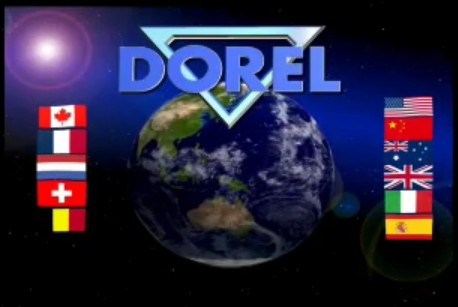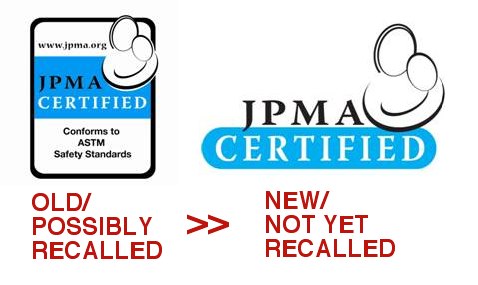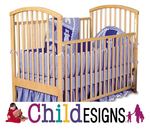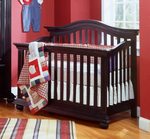
OK, getting some clarification on why Dorel, one of the biggest crib makers in the country, and probably the most prominent member of the Juvenile Products Manufacturers Association, doesn't JPMA-Certify their cribs, and what that means about the safety standards Dorel Asia applies to their cribs. I think I'm starting to figure it out.
I spoke to Dorel spokesperson Julie Vallesse, who explained that Dorel Asia's cribs meet both mandatory [CPSC] and voluntary [ASTM] standards, in other words, the same standards that JPMA uses for its flagship certification program. Which Dorel doesn't participate in, she told me, because Dorel uses "independent, certified" testing facilities to verify the same standards, and so JPMA Certification would be "redundant."
[Vallesse reached me while I was driving, and we talked while I was stopped on the side of the road with the kid in the backseat, so I can't give full-length, precise quotes from our conversation.]

And yesterday, I spoke to JPMA spokesperson Linda Woody, who declined to address the business decisions of individual JPMA members, which is understandable. She pointed out that in his House testimony last week, JPMA director Mike Dwyer did discuss two other features of JPMA Certification besides the CPSC/ASTM standards: annual product testing and spot-retail sampling and testing.
Does Dorel's own testing process use similar methods? Who knows? It doesn't sound like it. It's not like JPMA's methodology is off the hook, though; just last year, a million Simplicity cribs, sold over 10 years, were recalled, and all were JPMA Certified. But the disclosure and promotion of a multi-step safety testing process is a step in the right direction.
When I asked Woody if the JPMA had previously certified Dorel cribs and stopped, she pointed out that Dorel Asia was a separate subsidiary of Dorel Industries. Which, indeed, it is. She then invited me to get involved and make a difference by attending the next ASTM crib meeting. [After thinking about it, I decided that a safety standards system where a random blogger can drop by and actually affect things instills even less confidence, so I'll assume she was just being polite.]
Anyway, as I was trying last night to find statements from Dorel describing their own, preferred, superior standards testing process, I found two things:
1) In 2001, Dorel was hit with a $1.75 million fine, the biggest in consumer safety history to that point, for not sharing injury and incident data with the CPSC for numerous Cosco and Safety 1st products, including cribs. Cosco cribs and crib mattresses were subject to several huge recalls in the mid-1990s, and it sounds like Cosco/Dorel did its own thing then, too. From a href="http://www.nytimes.com/2001/04/05/business/baby-product-maker-to-pay-1.75-million-safety-fine.html">a NY Times report 3-4 years after the recalls and infant deaths:
Mark Evanko, the vice president for quality assurance at Dorel, said the company is now testing all of its products at least twice and plans to establish test procedures to make sure consumers can easily understand instructions and correctly assemble its products. [emphasis added]Another Dorel executive actually said, "now that Dorel has a better understanding of the government's reporting requirements, it will do better flagging problems." Yes, please learn as you go, country's largest baby gear manufacturer! Kaizen!
2) But the real explanation may be more recent. And I feel like a dope for not connecting the dots before now. Remember way back in 2008-9, when Jardine cribs were being recalled--and recalled--and recalled, finally totalling almost 500,000 cribs? Jardine was [is?] a budget crib brand manufactured exclusively for Babies R Us by--you guessed it--Dorel Asia. The Jardine defects--faulty hardware, weak slats, strangulation, entrapment--are practically identical to the Dorel Asia recall.
At the time, BRU announced they were instituting their own crib testing regime, which incorporated Canadian and EU standards as well as ASTM/CPSC. Is that Dorel Asia's independent testing system? I doubt it, because BRU only started it in October 2008.
So yes, if a manufacturer does their own testing, and then each retailer requires their own, related-but-different testing, and then JPMA has a certification program on top of that, I can understand how that might be considered "redundant." I can also see how it might be considered a giant, confusing, and ineffective cluster*#$% that has millions of parents wondering if their kid's crib is safe. Glad we got that cleared up.
Previously:
Another Day, Another 635,000 Dorel Cribs Recalled
Cheap Crib Recalls R Us: Dorel x BRU Cribocalypse Tally Climbs To 472,450



This is all so confusing and ridiculous! Thanks for trying to decode it all for us. I think I've decided we'll just skip the crib altogether and go straight for a mattress on the floor when the time comes. That will give us peace of mind until her toothbrush or pajamas or whatever else are recalled.
This is where I pull the plug on our plans to get another Go booster seat now that our second kid is outgrowing her convertible seat. I'd hoped Safeguard was still manufacturing them, but no. And even if they were, I don't want one dime of my money to go to Dorel. Between this and the carseat shennanigans covered by the Chicago paper, Dorel is dead to me.
And that's fine, as far as it goes. But that's a real me-and-mine solution. What's the bigger approach? Can people mobilize to get this stuff changed for good?